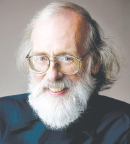
Tony Hunter, PhD
Tony Hunter, PhD, a British-American biologist who is a Professor of Biology at the Salk Institute for Biological Studies, has received a National Cancer Institute (NCI) Outstanding Investigator Award, which supports accomplished leaders in cancer research. He will receive more than $7,500,000 over the next 7 years to further his work.
Dr. Hunter is known for his elucidation of a mechanism called tyrosine phosphorylation, which is a molecular switch that turns normal cells cancerous. The breakthrough led to the development of tyrosine kinase inhibitors such as imatinib, which revolutionized the treatment of chronic myeloid leukemia and several other forms of cancer. Dr. Hunter’s work has led to a complete catalog of the 90 human genes that encode tyrosine kinases, over half of which have become targets for the development of drugs to treat cancer and other human diseases. Currently, 37 tyrosine kinase inhibitors are U.S. Food and Drug Administration–approved for human therapy, with many more in late-stage clinical trials.
“I am excited to have been recognized in this way, and delighted that this award will provide stable funding for the next seven years to support our work on histidine phosphorylation in cancer,” said Dr. Hunter. “Having discovered tyrosine phosphorylation and its role in cancer near the start of my career at the institute, it is somehow fitting that 40 years later, near the end of my career, this award will allow me to study another new protein phosphorylation and its role in cancer.”
With the NCI funding, Dr. Hunter plans to examine a different type of phosphorylation, called histidine phosphorylation, which occurs when a phosphate is added to the amino acid histidine in proteins. He is interested in discovering how the reversible attachment of a phosphate to histidine works on a molecular level in order to better understand how it affects protein regulation and activity. He suspects the phosphorylation of histidine may play an important role in normal cell function, human disease such as cancer, and could serve as a new cancer therapeutic target.
Dr. Hunteris the third Salk scientist in the award’s 5-year history to be named an NCI Outstanding Investigator. The others include Professor Reuben Shaw and Professor Geoffrey Wahl. ■

